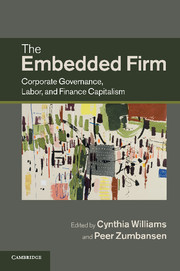Book contents
- Frontmatter
- Contents
- Figures
- Tables
- Contributors
- 1 Introduction: corporate governance after the ‘end of history’
- Part I Historical trajectories of business and regulation
- 2 Corporate governance and financial crisis in the long run
- 3 Financialism
- 4 Legitimating power
- 5 Engaging corporate boards
- 6 The primacy of Delaware and the embeddedness of the firm
- 7 The new embeddedness of the corporation
- Part II New interests, new shareholder constellations, new landscapes
- Part III Labor’s evolution in the new economy
- Part IV The transnational embedded firm and the financial crisis
- Part V Conclusion
- Index
- References
6 - The primacy of Delaware and the embeddedness of the firm
from Part I - Historical trajectories of business and regulation
Published online by Cambridge University Press: 07 September 2011
- Frontmatter
- Contents
- Figures
- Tables
- Contributors
- 1 Introduction: corporate governance after the ‘end of history’
- Part I Historical trajectories of business and regulation
- 2 Corporate governance and financial crisis in the long run
- 3 Financialism
- 4 Legitimating power
- 5 Engaging corporate boards
- 6 The primacy of Delaware and the embeddedness of the firm
- 7 The new embeddedness of the corporation
- Part II New interests, new shareholder constellations, new landscapes
- Part III Labor’s evolution in the new economy
- Part IV The transnational embedded firm and the financial crisis
- Part V Conclusion
- Index
- References
Summary
Introduction
The concept of embeddedness can be traced to Karl Polanyi’s The Great Transformation. The book is a history of the commoditization of English society from the eighteenth century forward, recounting how markets became unstitched from the fabric of society. As markets became more distinct from everyday life, society began to change in order to meet the needs of markets. One example of this transformation was the enclosure of English farmlands and the end of the ancient system of farming on land that was considered free for the use of all. This created a radical disruption in social function. Without farmland, thousands were forced to move to sites of industrial production, generating a radical shift in society from traditional agrarian life to one that was dominated by factory work. In other words, the book explains how markets became dis-embedded from society and then how these dis-embedded markets altered social activities as they became embedded into market function.
Polanyi never believed that society could become completely embedded within the market function, concluding that society’s members would never tolerate a market function which completely overwhelmed their other social needs. This resistance to market pressures is what Polanyi called the “double movement.” Simon Deakin has elaborated on Polanyi’s idea of the double movement, explaining how it also operates in reverse. In other words, market actors will resist projects for greater equality, when these social demands compromise market function. The balance between favoring the needs of markets or the needs of society has fluctuated throughout the twentieth century. According to Deakin, the pendulum is swinging toward the needs of markets today, as societal governance is evermore closely tied to the expectations of investors. Today, certainly, the pendulum appears to swing in a different, yet still unknown, direction.
- Type
- Chapter
- Information
- The Embedded FirmCorporate Governance, Labor, and Finance Capitalism, pp. 104 - 118Publisher: Cambridge University PressPrint publication year: 2011
References
- 1
- Cited by



